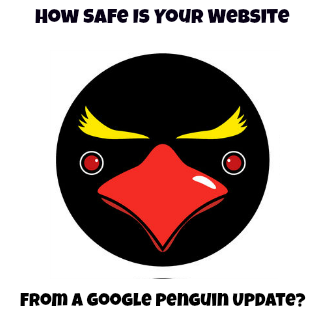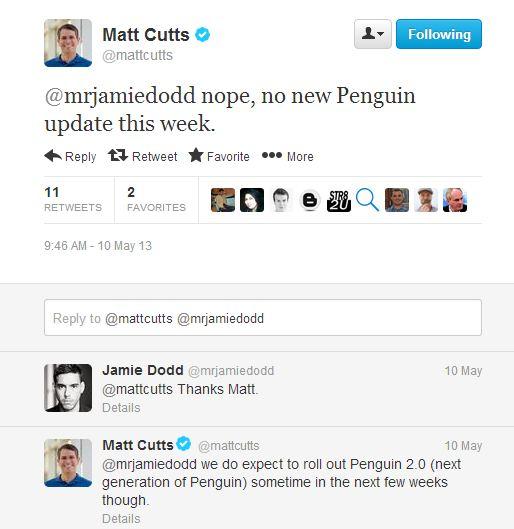 When Google releases its long-anticipated Penguin 2.0 update within the next few weeks, will you see a massive drop in your website's traffic?
When Google releases its long-anticipated Penguin 2.0 update within the next few weeks, will you see a massive drop in your website's traffic?
Do you have any idea what I'm talking about?
What's a Google Algorithm?
Basically, the Google algorithm is the set of programs and formulas that Google uses to assign a Page Rank to a website on a particular topic. It's the way that Google sifts and sorts the thousands or millions of pages that might possible answer a given search engine query, and figures out which ones are most relevant to the person searching.
Or more simply put – it's the process Google uses to make sure that you get a solid answer to your question instead of you receiving a bunch of keyword stuffed pieces of crappy content as your results when you look something up.
What's a Google Penguin Update (and why should you care)?
The process or formula that Google uses to rank webpages (aka the algorithm we just talked about a second ago) isn't something set in stone. It's not a set it and forget it kind of thing on Google's part. They are constantly monitoring search engine results and then tweaking the algorithm, either a little or a lot, to improve the quality of the results delivered.
Some of the algorithm updates are minor. Some, well, not so much.
Two of the most talked about Google algorithm updates were named Penguin and Panda, and each has seen changes since its release.
About Google Penguin
Released just over a year ago (April 2012), the Google Penguin update was meant to level the playing field for people using legitimate SEO techniques (sometimes called white-hat SEO) and less ethical (aka black-hat SEO) techniques. They specifically targeted keyword stuffing, cloaking, paid link schemes, and creating duplicate content, among other less than ethical techniques.
Over the past few weeks, there's been a serious amount of chatter online about whether or not the new Google Penguin update had hit, but Google's Distinguished Engineer Matt Cutts denied that it had been released yet.

Are you starting to see how a Google Penguin update might affect you? Of course it depends on how you're getting your Page Rank. Are you creating amazing content and sharing it the "old-fashioned way"? (If word of mouth via social media can be counted as old-fashioned, compared to black-hat SEO, anyway! <wink>)
Now – if you have been following Google's updates, you might notice that there have been revisions to Penguin in May and October of 2012. However – Matt Cutts has said that this update is the first revision substantial enough to warrant a new number; the others have been only minor tweaks.
So What Does This Mean for My Website?
Whether minor tweaks or major revisions, the question anyone with a website should be asking is this: "How safe is my site's ranking from a Google Penguin update?"
The first thing you'll want to do is to make sure you're using Google webmaster tools (or a similar analytics program) to track traffic to your page (at a minimum). If you notice a significant change within the next few weeks, there's a chance it might be due to the Penguin revision.
Because at the end of the day, what matters to you as a business owner is how likely people are to find your product or service as the result of a Google search. This is what changes in the Google algorithm are all about.
When Penguin 2.0 is released, will you see a serious drop in your rank, or will your results remain fairly constant (or improve)?
In his video on Google's Webmaster channel on You Tube about the upcoming Penguin change, Matt Cutts had this to say about the upcoming Penguin update:
"In terms of what you should be working on, we try to make sure that that is pretty constant and uniform. We try to make sure that you make a great site that users love that they'll want to tell their friends about, bookmark, come back to, visit over and over again, you know, all the things that make a site compelling. We try to make sure that if that's your goal, we're aligned with that goal, and therefore, as long as you're working hard for users, we're working hard to try to show your high quality content to users as well." (Matt Cutts, 2013).
The head of Google's web spam control efforts is saying the very same thing we say over and over. If you're creating original, high-quality content that people want to read and share, chances are that Google's efforts to provide that kind of content in search engine results is only going to help you.
But if you or the SEO company you've hired are trying to use questionable, sneaky tactics to get your website ranking, you might find your rank starts to tank in the next few weeks when Penguin 2.0 comes out.
Share with us! Are you worried about the new updates? Do you have any questions? Leave a comment or a tip about the new updates below.

